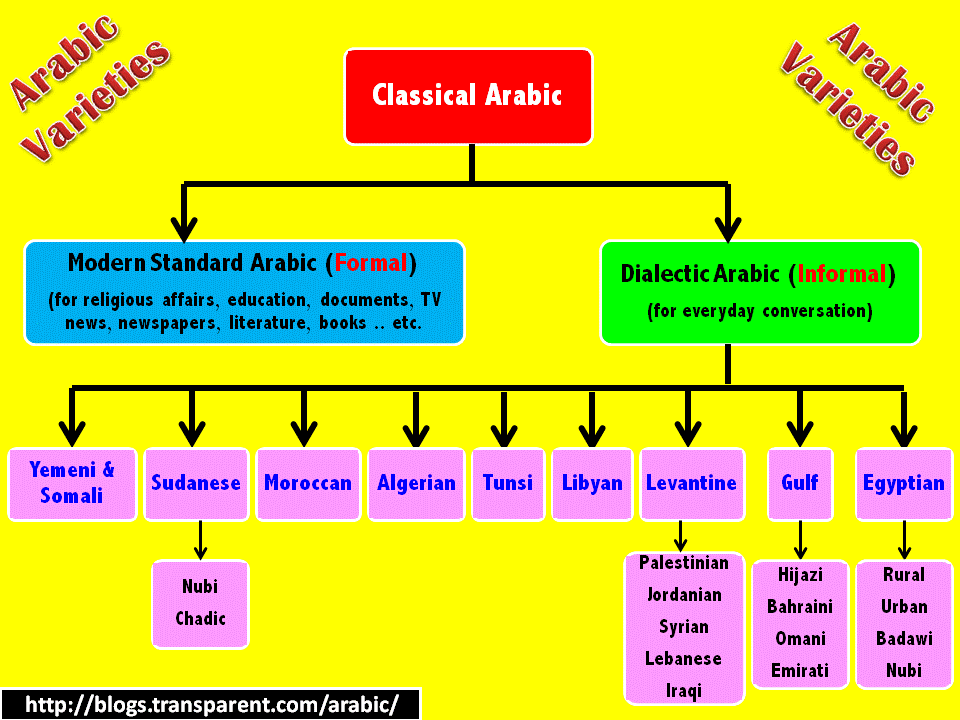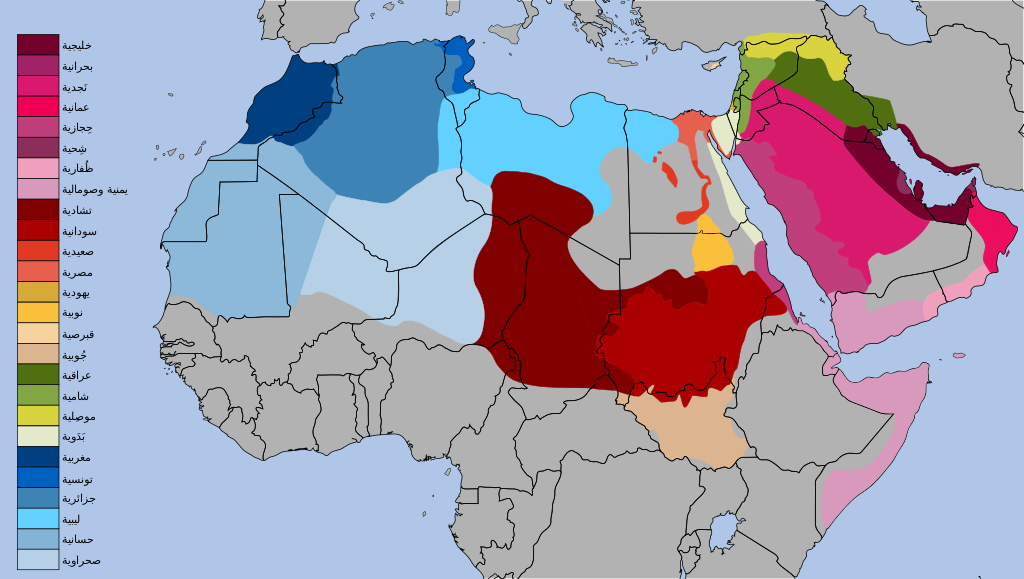The Arabic Headache; Dialect! Posted by Fisal on Dec 23, 2015 in Arabic Language, Culture, Grammar, Pronunciation, Vocabulary
Ahlan, Arabic lovers! Today, we are going to discuss a very common problem for non-Arabic natives. Yes, it is that dialect headache! Which Arabic variety should foreigners learn; Classical Arabic (CA), Modern Standard Arabic (MSA) (Al-Fus’ha) or Colloquial Arabic with its various dialects (Al-Am’iyah)? Unfortunately, there is no one correct answer. Deciding on one Arabic level or variation depends totally on every learner’s needs; it is absolutely a personal choice! However, Modern Standard Arabic (Fus’ha) is widely recommended as a start of Arabic learning for if you learn the basics, it is probably easier to achieve higher proficiency levels in either classical or in any dialect.

Arabic Varieties Info-graphic
Why should a non-native start with Modern Standard Arabic? The answer is simply because it is the formal language. It is the widely understood in all Arab countries. You may look weird speaking it in an informal situation but still people will be tolerant and respectful when they know the fact that you are not a native.
A Brief History of Arabic
- Arabic is a Semitic language that has deep roots in history (Classical Arabic).
- Although Arabic was spoken all over the Arabian Peninsula before Islam, each tribe had their own differences (dialect).
- The Arabic dialect of Quraysh (Makkah) was the most common because all Arabs came for pilgrimage and visit Ka’bah since the time of Abraham (Ibrahim) and Ishmael (Isma’il).
- The Qur’an came in Arabic as a linguistic miracle and challenge to the Arabs who claimed eloquence.
- As Islam expanded to nations outside the Arabian Peninsula, Arabic spread and prevailed.
- Arabic interacted with other languages and hence appeared the modern standard Arabic (MSA) and the colloquial Arabic (dialects).
- For more information, read this report entitled; A History of the Arabic Language.
Modern Arabic (Fus’ha) vs. Colloquial Arabic (Ami’yah)
- Ami’yah is the language of common people whereas Fus’ha is that of the elite and well-educated (informal vs. formal).
- Ami’yah is free from all kinds of restrictions and rules opposed to Fus’ha.
- Ami’yah with its different dialects is restricted to some geographical areas (e.g. Egyptian, Gulf, Levantine Moroccan … etc) even inside the same country whereas Fus’ha is imposed on all people as the medium of education.
- Ami’yah is the language that children grow up speaking whereas Fus’ha is not learnt until school.
- Ami’yah is distinguished by its many dialects even within the same country whereas Fus’ha is the language of Qur’an that should be read according to the rules of Fus’ha.
- Illiterate people who speak only Ami’yah may find difficulties understanding Fus’ha.
- Ami’yah is lacking in scientific idioms and specialized modern terminology opposed to Fus’ha.
- Ami’yah has so many subcategories; e.g. the languages of different social classes. There is no such phenomenon in Fus’ha.
- Ami’yah is very short in synonyms; there is usually one word that is enough for conveying the meaning whereas Fus’ha is very rich in synonyms.
- Ami’yah is rarely registered in the form of publications (books newspapers, magazines, documents … etc) whereas libraries are full of Fus’ha resources.
- Ami’yah dictionaries and reference books are rare in opposition to Fus’ha.
- Most Arabic proverbs are in Ami’yah.
- A lot of Ami’yah words are derived from Fus’ha.
******
Check us back Soon
Peace سلام /Salam/

Build vocabulary, practice pronunciation, and more with Transparent Language Online. Available anytime, anywhere, on any device.
About the Author: Fisal
Well, I was born near the city of Rasheed or Rosetta, Egypt. Yes, the city where the Rosetta Stone was discovered. It is a small city on the north of Egypt where the Nile meets the Mediterranean. I am a Teacher of EFL.





Comments:
Andy:
Hi Fisal. From my own experience and that of others I know, I’d say the decision about whether to learn MSA or a dialect first depends completely on the circumstances. As a foreigner living in an Arabic-speaking country (Egypt), the breakthrough to fluency came with learning the dialect first. After that, it became easier to learn to read and write in MSA. The problem with learning MSA first is that it is very difficult to find situations to practise it. Without practice, language learning is much more difficult. The actual dialect itself is a factor – speaking Egyptian dialect works anywhere in the Arab world. More or less the same applies to Levantine.
Fisal:
@Andy Hi Andy. You are absolutely right and this is what we stressed in the blog when we said the decision is absolutely personal. You were lucky enough to travel to a native Arabic-speaking country before you learn the MSA. I have seen lots of cases like you. On the other hand, there are many other people who don’t usually get that chance! Immersion in the culture of the language helps a great deal, no doubt. It provides a lot of practice that improves fluency a great deal. Let’s not also forget the importance of accuracy which comes from formal study of the language grammar. I will do some more posts on this topic. Stay tuned 🙂
yusra:
Somali isn’t even an arabic language…
Fisal:
@yusra Hi yusra, please check the following link 🙂
http://www.omniglot.com/writing/somali.htm